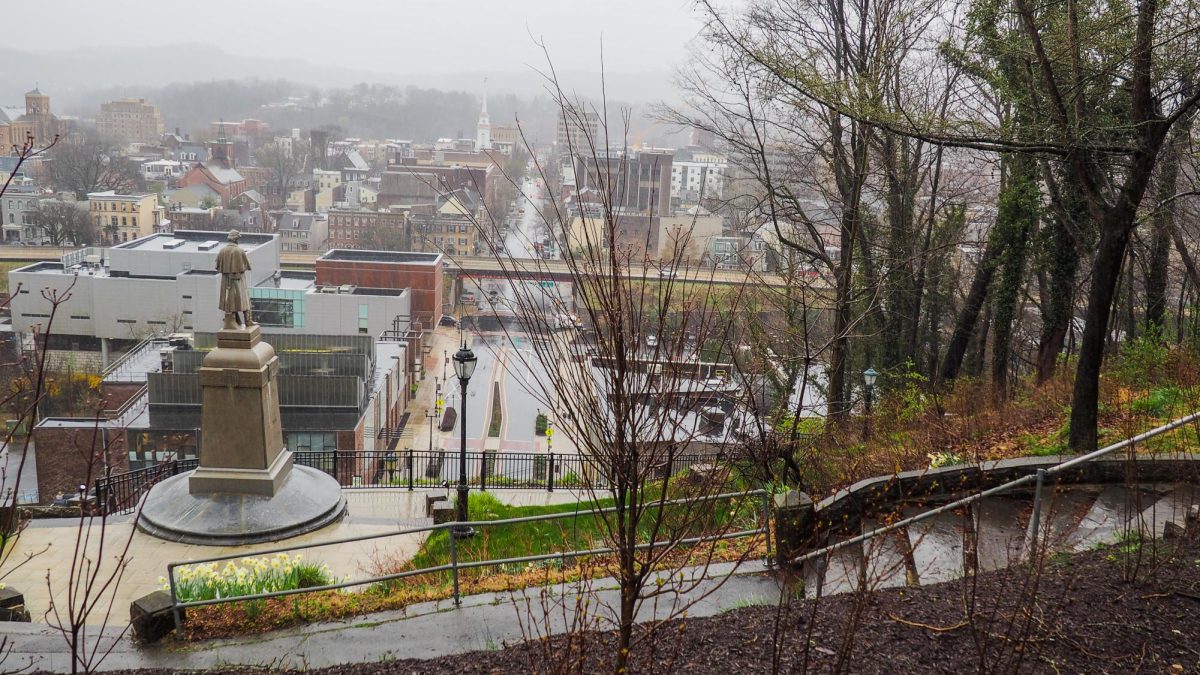The Easton Environmental Advisory Council believes that Lafayette College is responsible for erosion across the hillside adjacent to College Avenue. This, the council says, is because the college deforested the hill to make way for its $6 million escarpment trail.
Ian Kindle, the chairman of the Environmental Advisory Council, first noticed signs of erosion in mid-March. Since then, the council has reached out to the stairs’ planning crew to start conversations on whether more work is in store for the hill.
“It’s right about this time of year when [plant] species should be getting put in and we should be looking at where we can see evidence of water movement over the wintertime,” Kindle said.
Emily Papp, the head of the planning crew from Aegis Development, has served as the council’s primary liaison in facilitating communication between the council and the college. She could not be reached for comment.
In the fall of 2023, the crew planted a variety of vegetation along the hillside as a precautionary measure to prevent erosion. However, the city forester Rob Christopher concluded that no large-scale trees could be replanted due to the steepness of the slope.
As a result, the hill still has a higher risk of erosion, according to Kindle.
“When you have trees and you have shrubs, it creates a barrier to water moving downhill and it will disperse water impacts over larger areas,” Kindle said. “Once those things go away … it’s going to start wearing away and taking soils and rock with it.”
According to Kindle, evidence of this erosion is most noticeable in several locations, including the lower parts of the slope along Bushkill Drive and behind Don Juan Mex Grill.
College spokesman Scott Morse, in an email, alluded to plans for more landscaping work on the hill this spring but did not disclose specifics.
“We remain committed to the escarpment trail landscaping plans that were discussed with the City in the fall,” Morse wrote. “Now that spring weather is just around the corner, we look forward to following through on those planting arrangements and continuing to work closely with the city, particularly Rob Christopher.”
Despite ongoing conversations between the college and the council, Kindle believes the college could have been more proactive this winter.
“Ideally, it’s too late now,” Kindle said. “Ideally, a project like this would be planned for during the winter months.”
Kindle emphasized that most native species are naturally “cold hardy” and thrive when planted before the onset of hot summer weather. Therefore, he said it is crucial to plan for planting well in advance to accommodate for their preferred growing cycle.
However, if planting cannot be done in time before summer, Kindle argued that other work should be done in the meantime.
“Projects like water mitigation can and should start soon because as the spring and summer goes through, we expect more torrential heavy downpours which will be the events that cause the most problems with erosion,” Kindle said.
“The bigger picture here is not only that we don’t want landslides and don’t want the hill sliding down into downtown, but we also don’t want excess dirt and rock and things coming down into the creek and then going into the Delaware River,” he continued.
























































































































